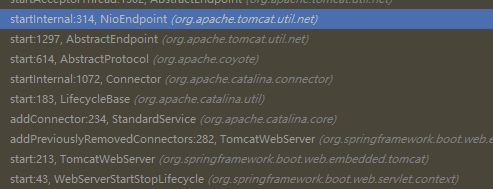一、前言
JAVA后端项目,运行在容器tomcat中,由于现在springboot的内置tomcat容器,其默认配置屏蔽了很多对tomcat的认知,但是对tomcat的学习和认识是比较重要的,所以专门查资料加深了理解,本文主要讨论在springboot集成下的tomcat9的请求过程,线程模型为NIO。
二、tomcat结构
找了张结构图,每个模块的意思和作用就不详解了,可以搜其他文章
三、探讨tomcat是如何处理请求
自己画了一个connector的结构
1、初始化
在springboot启动后,org.springframework.context.support.AbstractApplicationContext#finishRefresh,这里进去调用org.springframework.boot.web.servlet.context.WebServerStartStopLifecycle.start()方法启动TomcatWebServer,初始化tomcat。
通过这样的调用链到达org.apache.tomcat.util.net.NioEndpoint#startInternal(),进行初始化Endpoint中的Acceptor和Poller,这两者都实现了Runnable接口,初始化后就通过线程start启动了。
2、如何处理客户端请求
Acceptor: 接收器,作用是接受scoket网络请求,并调用setSocketOptions()封装成为NioSocketWrapper,并注册到Poller的events中。注意查看run方法org.apache.tomcat.util.net.Acceptor#run
@Override
public void run() {
int errorDelay = 0;
try {
// Loop until we receive a shutdown command
while (!stopCalled) {
// Loop if endpoint is paused
while (endpoint.isPaused() && !stopCalled) {
state = AcceptorState.PAUSED;
try {
Thread.sleep(50);
} catch (InterruptedException e) {
// Ignore
}
}
if (stopCalled) {
break;
}
state = AcceptorState.RUNNING;
try {
//if we have reached max connections, wait
endpoint.countUpOrAwaitConnection();
// Endpoint might have been paused while waiting for latch
// If that is the case, don't accept new connections
if (endpoint.isPaused()) {
continue;
}
U socket = null;
try {
// 等待下一个请求进来
socket = endpoint.serverSocketAccept();
} catch (Exception ioe) {
// We didn't get a socket
endpoint.countDownConnection();
if (endpoint.isRunning()) {
// Introduce delay if necessary
errorDelay = handleExceptionWithDelay(errorDelay);
// re-throw
throw ioe;
} else {
break;
}
}
// Successful accept, reset the error delay
errorDelay = 0;
// Configure the socket
if (!stopCalled && !endpoint.isPaused()) {
// 注册socket到Poller,生成PollerEvent事件
if (!endpoint.setSocketOptions(socket)) {
endpoint.closeSocket(socket);
}
} else {
endpoint.destroySocket(socket);
}
} catch (Throwable t) {
ExceptionUtils.handleThrowable(t);
String msg = sm.getString("endpoint.accept.fail");
// APR specific.
// Could push this down but not sure it is worth the trouble.
if (t instanceof Error) {
Error e = (Error) t;
if (e.getError() == 233) {
// Not an error on HP-UX so log as a warning
// so it can be filtered out on that platform
// See bug 50273
log.warn(msg, t);
} else {
log.error(msg, t);
}
} else {
log.error(msg, t);
}
}
}
} finally {
stopLatch.countDown();
}
state = AcceptorState.ENDED;
}
Poller:轮询器,轮询是否有事件达到,有请求事件到达后,以NIO的处理方式,查询Selector取出所有请求,遍历每个请求的需求,分配给Executor线程池执行。查看org.apache.tomcat.util.net.NioEndpoint.Poller#run()
public void run() {
// Loop until destroy() is called
while (true) {
boolean hasEvents = false;
try {
if (!close) {
hasEvents = events();
if (wakeupCounter.getAndSet(-1) > 0) {
// If we are here, means we have other stuff to do
// Do a non blocking select
keyCount = selector.selectNow();
} else {
keyCount = selector.select(selectorTimeout);
}
wakeupCounter.set(0);
}
if (close) {
events();
timeout(0, false);
try {
selector.close();
} catch (IOException ioe) {
log.error(sm.getString("endpoint.nio.selectorCloseFail"), ioe);
}
break;
}
// Either we timed out or we woke up, process events first
if (keyCount == 0) {
hasEvents = (hasEvents | events());
}
} catch (Throwable x) {
ExceptionUtils.handleThrowable(x);
log.error(sm.getString("endpoint.nio.selectorLoopError"), x);
continue;
}
//查询selector取出所有请求
Iterator iterator =
keyCount > 0 ? selector.selectedKeys().iterator() : null;
// Walk through the collection of ready keys and dispatch
// any active event.
while (iterator != null && iterator.hasNext()) {
SelectionKey sk = iterator.next();
iterator.remove();
NioSocketWrapper socketWrapper = (NioSocketWrapper) sk.attachment();
//处理请求key
if (socketWrapper != null) {
processKey(sk, socketWrapper);
}
}
// Process timeouts
timeout(keyCount,hasEvents);
}
getStopLatch().countDown();
}
请求过程大致如下图:
总结
本篇文章就到这里了,希望能够给你带来帮助,也希望您能够多多关注脚本之家的更多内容!




